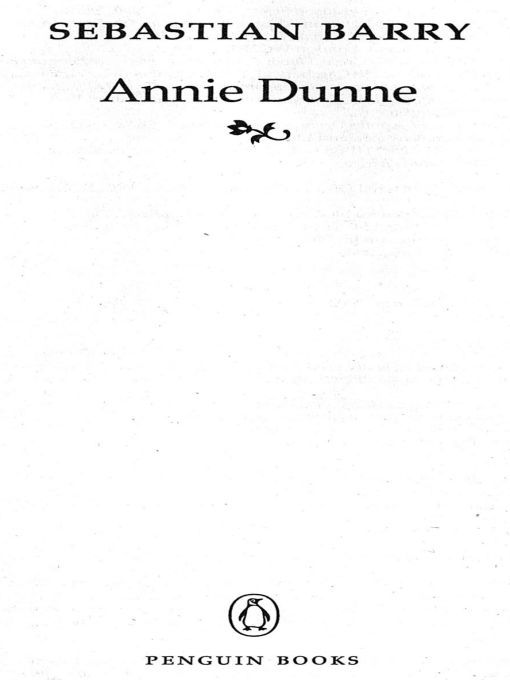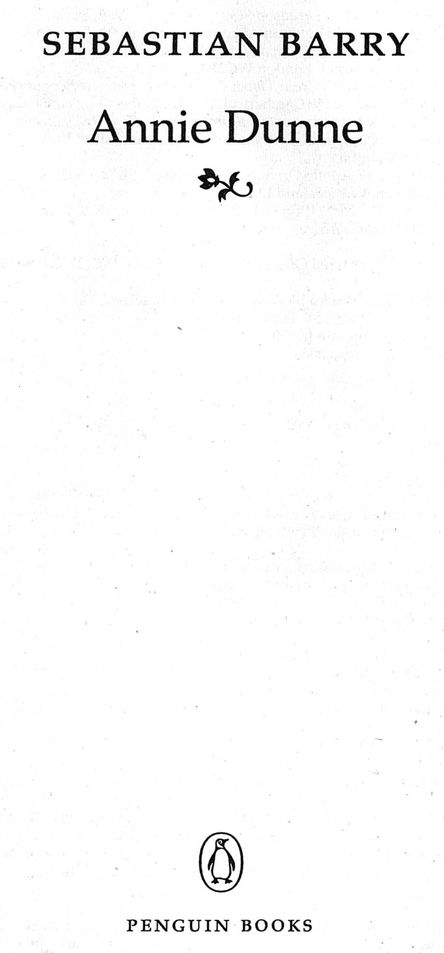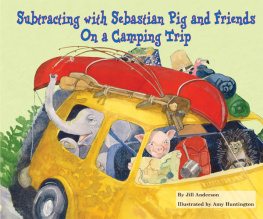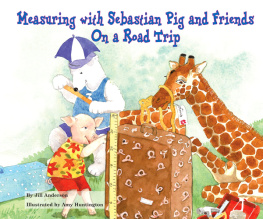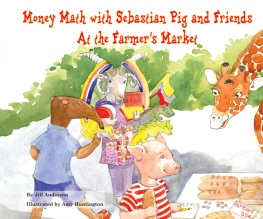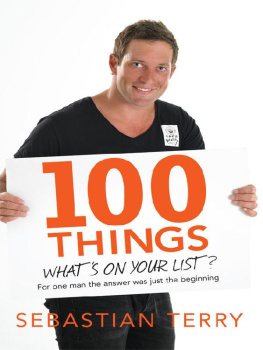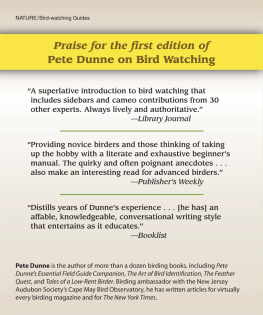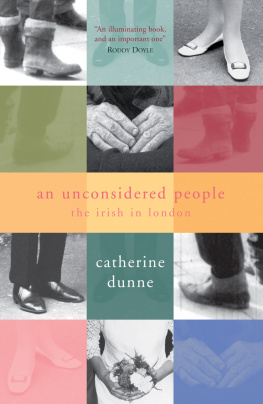Table of Contents
Praise for Annie Dunne
As a wordsmith, Barry is at times amazing, his descriptions poetic and insightful.
The Philadelphia Inquirer
Rarely has the precious interaction between the old and the young been captured in such beauty and tenderness .. a remarkable novel.
The Christian Science Monitor
Barrys prose is lyrical ... in each novel Barry pays tribute to the complex resilience of the human spirit.The Miami Herald
Barrys gift for image and metaphor ... are equaled here by his eye for descriptive detail.
Publishers Weekly
PENGUIN BOOKS
ANNIE DUNNE
Sebastian Barry was born in Dublin in 1955 and read Latin and English at Trinity College, Dublin, where he was later Writer Fellow in 1996. He is the author of The Whereabouts of Eneas McNulty and A Long Long Way, which was shortlisted for the Man Booker Prize. He has also written several award-winning plays, among them The Steward of Christendom, Our Lady of Sligo, and most recently The Pride of Parnell Street. In 2006 he was Heimbold Visiting Professor at Villanova University, Pennsylvania. He lives in Wicklow, Ireland with his wife Ali and three children, Merlin, Coral and Tobias.
To Derek Johns
Chapter One
Oh, Kelsha is a distant place, over the mountains from everywhere. You go over the mountains to get there, and eventually, through dreams.
I can picture the two children in their coats arriving. It is the start of the summer and all the customs of winter and spring are behind us. Not that those customs are tended to now, much.
My grand-nephew and grand-niece, titles that sound like the children of a Russian tsar.
My crab-apple tree seems to watch over their coming, like a poor man forever waiting for alms with cap in hand. There is a soughing in the beech trees and the ash, and the small music of the hens. Shep prances about like a child at a dance with his extra coat of bog muck and the yellow effluents that leak into yards where dogs like to lie.
The childrens coats are very nice coats, city coats. Their mother does not neglect the matter of coats, whatever else I could say about her. But they are too nice for a farmyard existence. We will wrap them in old brown paper and put them in the small blue cupboard in their room, and keep the moths from them as best we can.
I herd the children like little calves through the lower leaf of the half-door and into the beautiful glooms of the kitchen. The big sandwiches lie on the scrubbed table, poised like buckled planks on blue and white plates. Words are spoken and I sense the great respect Sarah has for their father Trevor, my fine nephew, magnificent in his Bohemian green suit, his odd, English-sounding name, his big red beard and his sleeked black hair like a Parisian intellectual, good-looking, with deep brown angry eyes. He is handing her some notes of money, to help us bring the children through the summer. I am proud of her regard for him and proud of him, because in the old days of my sisters madness I reared him. My poor sister Maud, that in the end could do little but gabble nonsense.
The great enterprise now, with Trevor and the childrens mother, is to cross the sea to London and see what can be done. There are only stagnant pools of things to tempt him here in his own country, there is nothing. He has trained himself up by a scholarship and I can smell the smell of hope in him, the young mans coat. But his hope is proficient and true. I have no doubt but that he will find himself and his care a place to lodge, and fetch about him, and gain employment. He has his grandfathers wholeness of purpose, who rose from a common police recruit to be the chief superintendent of B Division in Dublin, the capital of the whole country.
His father, Matt, Mauds husband, who as good as threw me from the house when finally she died, may drag his polished boots every morning from that rented house in Donnybrook to the savage margins of Ringsend, where he teaches painting and drawing to children who would as much like to learn them as to eat earwigs. Back and forth on that black bike with its winter lamp and ineffectual bell, thinking only of the summer when he can paint the midgy beauties of Wicklow, cursing his fate.
But Trevor has the strength and purpose of another generation, with his red beard.
He is kissing the childrens heads now and saying good-bye, be good, see you in a few months.
Every day I will write to you, says the little boy, which is comical since he is too young to know his writing. But the father is not listening to the son, he is staring away into nowhere, distracted no doubt by all the things he has to do, the arrangements, the tickets, the prayers that I think will rise up unbidden, though I know he professes to be a Godless man, one of those modern types that would make me fearful if it was not him.
Every day, every day, says the boy emphatically.
I am going to press flowers for you all summer in my autograph album, says the little girl. There wont be anyone to write their names in it down here.
Look after yourselves in London, I say to him. And you need not for a moment worry about the children. You will have enough to do setting yourselves up.
As soon as everythings in place, well send for them, Trevor says. Thank you, Aunty Annie. Its an enormous help.
Its no trouble, God knows. We are lucky to have them.
Dont spoil them, he says.
We will not. But we will look after them, certainly.
Good, Trevor says, and kisses my cheek, and away with him out into the paltry sunlight. He doesnt look back, though the children rush to the door.
Come in now, I say, in case they are going to miss their father loudly, like the knobs on a wireless suddenly turned up, and well show you your beds, and you can put your bits and bobs in the drawers and well be shipshape.
We hear, all of us, Sarah and me and the little ones, the car reversing out of the rough yard and out again onto the green road to Kiltegan. He will not go home by the Glen of Imail because he fears the rutted tracks and rightly. Oh, it is some other, older year still in those lonesome districts, no calendar there says 1959.
Sarah and me scrubbed out the old room, I say gently.
For a moment they are stuck, like beasts in the gap between two fields.
When youre not here with us, this old room goes to cobwebs. Though it got a mighty spring clean with the rest of the premises just in April. I limed the walls, so dont lean your nice clothes on them, or youll be getting streaks. And the fire is lit these two days, and the mattresses are aired as youd like.
The room is bleak, the room is bare. A tiny hill of brown turf with seams of garnet fire steams in the grate. The window is as small as an owl and frames the lower clutter of the ash tree outside, the big fierce hair of thin branches that grows up from the root.
The fireplace is a hole with a thin strip of painted iron for a mantelpiece. Nothing ticks in that room, the big clock is in the kitchen.
Are the mice still above us, Auntie Anne? the boy asks, and I can sense him make the leap, the little leap to us. He calls me Auntie Anne like his father, I notice, though in truth I am his great-aunt. It is like a compliment.

